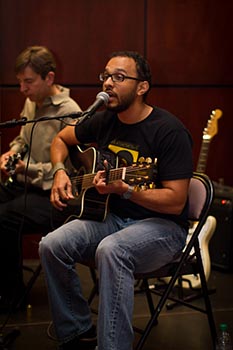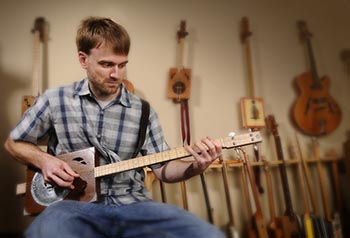While day jobs may prompt many to consider chasing down a dream, Josh Klapow, Ph.D., associate professor in the University of Alabama at Birmingham (UAB) School of Public Health, recommends carefully considering the pitfalls of turning a passion into a career.
 Gabriel Tajeu“We all dream of turning our hobbies into our livelihood, and we tend to read about and see the success stories – the stories of someone who has decided to give up a job and pursue their hobby as a career,” Klapow said. “What we don’t see are the failures. Pursuing a hobby as a vocation is not always the best move.”
Gabriel Tajeu“We all dream of turning our hobbies into our livelihood, and we tend to read about and see the success stories – the stories of someone who has decided to give up a job and pursue their hobby as a career,” Klapow said. “What we don’t see are the failures. Pursuing a hobby as a vocation is not always the best move.”
Gabriel Tajeu is enjoying the best of both worlds. A doctoral student and graduate research assistant in UAB’s School of Public Health, he also plays guitar in a cover band and released his own CD, “Finding My Way.”
Music is not just a hobby to him.
“It’s always been something that I would consider turning into a career if the door was opened to me, so I have continued to work on my music while pursuing my other passion, academia,” Tajeu said. “I love both of the things I do. Admittedly though, pursuing music as a main source of income and my primary career is a bit more terrifying. I would face a lot more economic uncertainty, and I’d be away from friends and family a lot.”
 Kirk WithrowFor UAB head and neck surgeon Kirk Withrow, M.D., making and playing musical instruments, painting and printing art work and rock climbing are activities that fill his free time.
Kirk WithrowFor UAB head and neck surgeon Kirk Withrow, M.D., making and playing musical instruments, painting and printing art work and rock climbing are activities that fill his free time.
“All of those are hobbies, and I would not want it any other way,” Withrow said. “As soon as you start ‘having’ to do something for a living, you run a significant risk of all of the fun and enjoyment being replaced by pressure and deadlines.”
Turning a hobby into a job can make it a requirement, not an escape, Klapow said. Many people underestimate the elements common to most jobs that can be stressful: the pressure to earn money and to conform to consumer, customer and market demands, as well as the logistics such as fiscal projections, human resource issues, taxes, wages and more. All of those elements can take a hobby and turn it into something less than enjoyable.
Before taking the plunge, Klapow said to first do a gut check and ask:
- If I truly have to do my hobby every day all day long, will I grow tired of it?
- What are the true financial implications of pursuing my hobby as a job; can I realistically make a living?
- How much harder will I need to work at my hobby if I make it a job; will the extra work take away from the fun of the hobby?
- Am I better off enjoying certain aspects of my job and having the time and freedom to do my hobby on my terms?
“The key to success is honesty with yourself,” Klapow said. “Do not be blinded by what looks like, on the surface, a dream come true.”